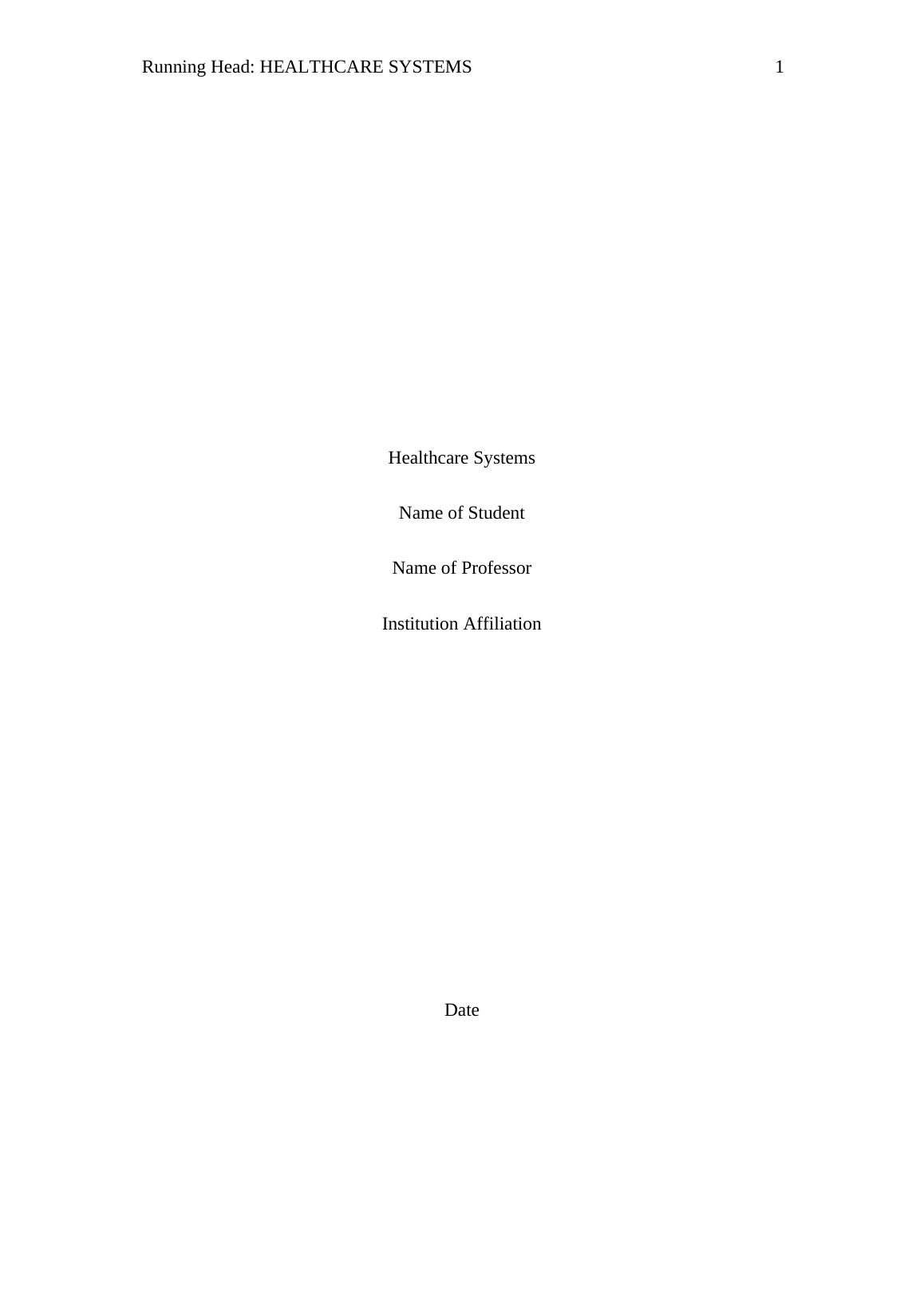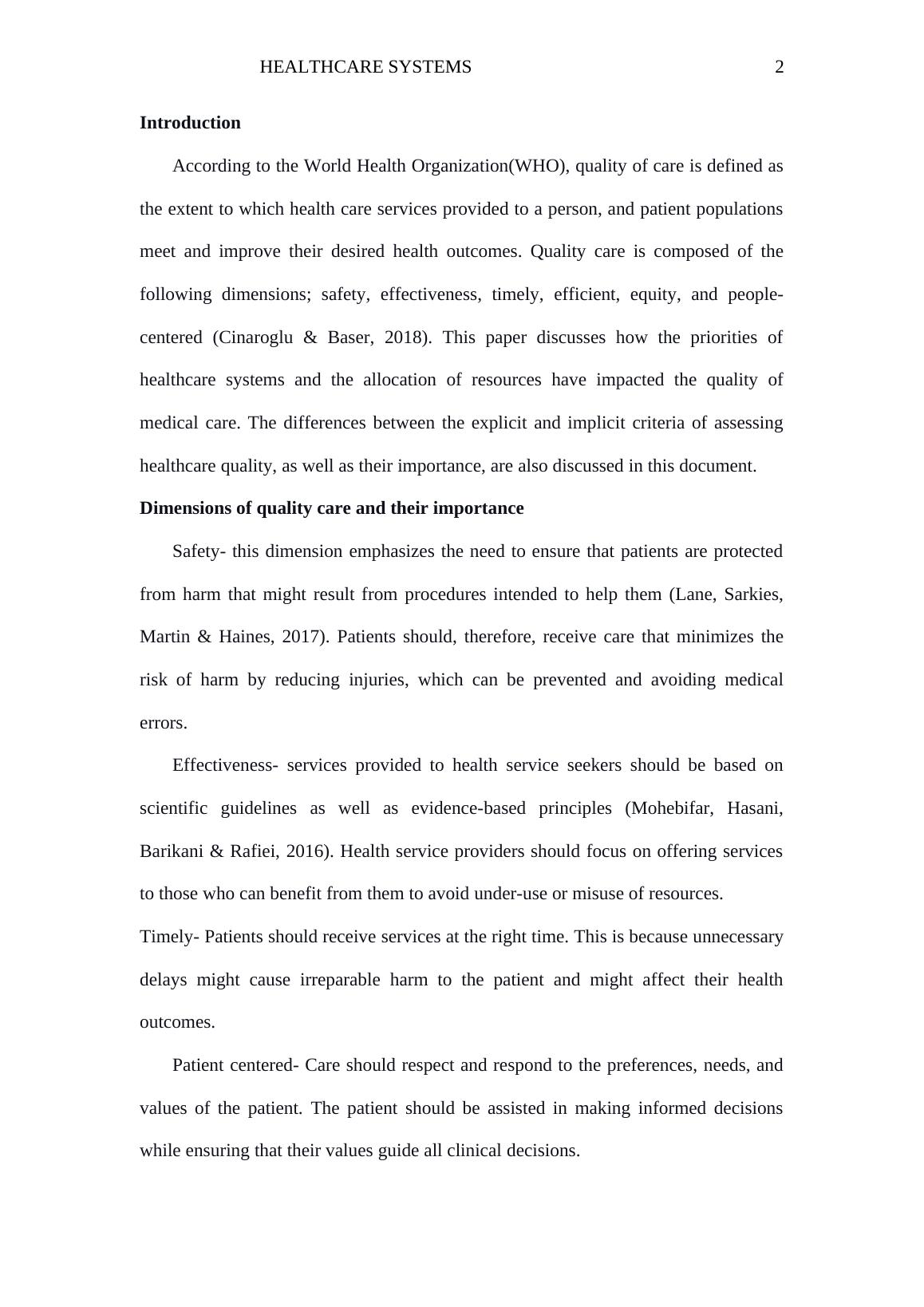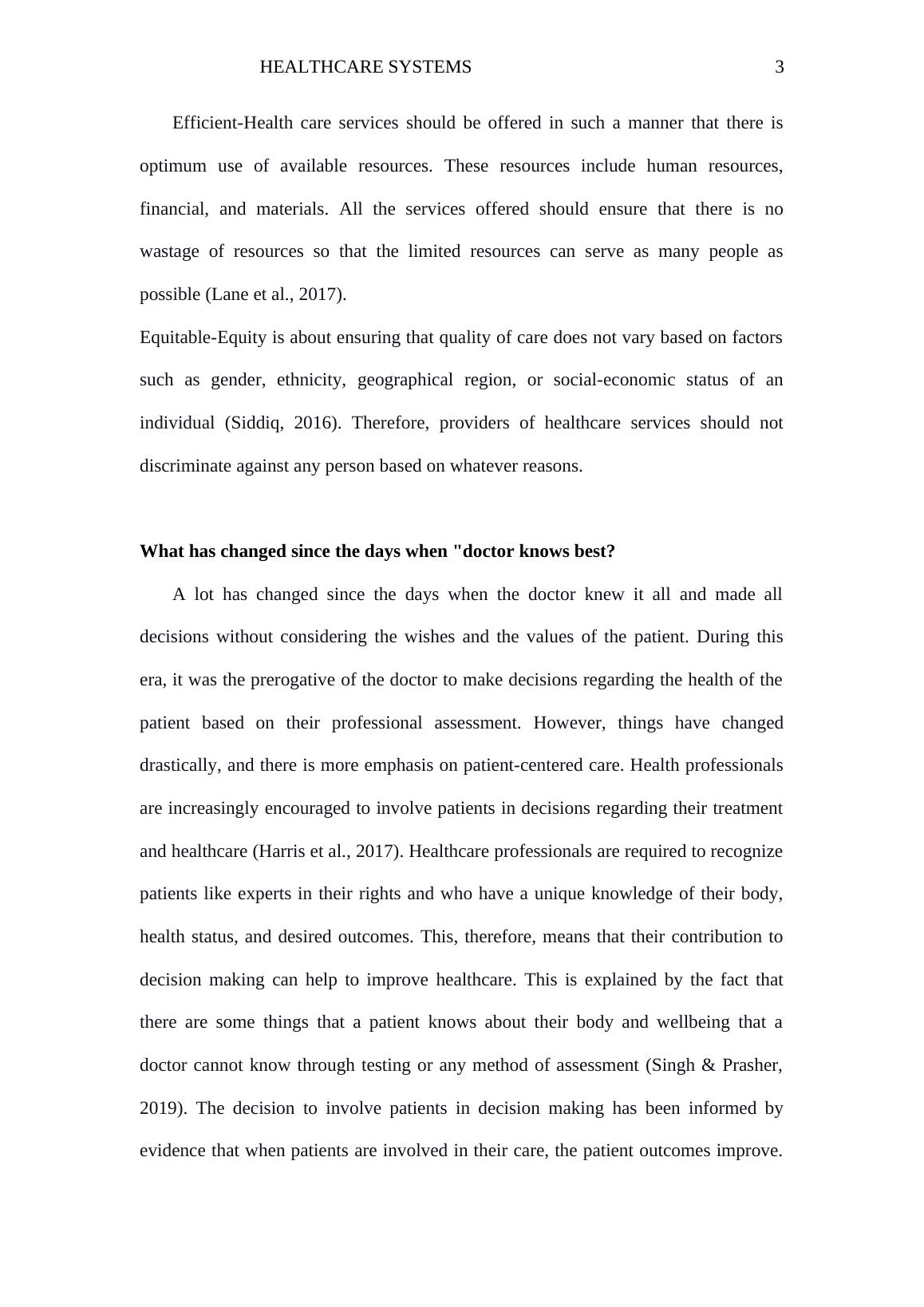Efficient-Health care services
Added on 2022-09-14
9 Pages2007 Words23 Views
Running Head: HEALTHCARE SYSTEMS 1
Healthcare Systems
Name of Student
Name of Professor
Institution Affiliation
Date
Healthcare Systems
Name of Student
Name of Professor
Institution Affiliation
Date

HEALTHCARE SYSTEMS 2
Introduction
According to the World Health Organization(WHO), quality of care is defined as
the extent to which health care services provided to a person, and patient populations
meet and improve their desired health outcomes. Quality care is composed of the
following dimensions; safety, effectiveness, timely, efficient, equity, and people-
centered (Cinaroglu & Baser, 2018). This paper discusses how the priorities of
healthcare systems and the allocation of resources have impacted the quality of
medical care. The differences between the explicit and implicit criteria of assessing
healthcare quality, as well as their importance, are also discussed in this document.
Dimensions of quality care and their importance
Safety- this dimension emphasizes the need to ensure that patients are protected
from harm that might result from procedures intended to help them (Lane, Sarkies,
Martin & Haines, 2017). Patients should, therefore, receive care that minimizes the
risk of harm by reducing injuries, which can be prevented and avoiding medical
errors.
Effectiveness- services provided to health service seekers should be based on
scientific guidelines as well as evidence-based principles (Mohebifar, Hasani,
Barikani & Rafiei, 2016). Health service providers should focus on offering services
to those who can benefit from them to avoid under-use or misuse of resources.
Timely- Patients should receive services at the right time. This is because unnecessary
delays might cause irreparable harm to the patient and might affect their health
outcomes.
Introduction
According to the World Health Organization(WHO), quality of care is defined as
the extent to which health care services provided to a person, and patient populations
meet and improve their desired health outcomes. Quality care is composed of the
following dimensions; safety, effectiveness, timely, efficient, equity, and people-
centered (Cinaroglu & Baser, 2018). This paper discusses how the priorities of
healthcare systems and the allocation of resources have impacted the quality of
medical care. The differences between the explicit and implicit criteria of assessing
healthcare quality, as well as their importance, are also discussed in this document.
Dimensions of quality care and their importance
Safety- this dimension emphasizes the need to ensure that patients are protected
from harm that might result from procedures intended to help them (Lane, Sarkies,
Martin & Haines, 2017). Patients should, therefore, receive care that minimizes the
risk of harm by reducing injuries, which can be prevented and avoiding medical
errors.
Effectiveness- services provided to health service seekers should be based on
scientific guidelines as well as evidence-based principles (Mohebifar, Hasani,
Barikani & Rafiei, 2016). Health service providers should focus on offering services
to those who can benefit from them to avoid under-use or misuse of resources.
Timely- Patients should receive services at the right time. This is because unnecessary
delays might cause irreparable harm to the patient and might affect their health
outcomes.

HEALTHCARE SYSTEMS 3
Patient centered- Care should respect and respond to the preferences, needs, and
values of the patient. The patient should be assisted in making informed decisions
while ensuring that their values guide all clinical decisions.
Efficient-Health care services should be offered in such a manner that there is
optimum use of available resources. These resources include human resources,
financial, and materials. All the services offered should ensure that there is no
wastage of resources so that the limited resources can serve as many people as
possible (Lane et al., 2017).
Equitable-Equity is about ensuring that quality of care does not vary based on factors
such as gender, ethnicity, geographical region, or social-economic status of an
individual (Siddiq, 2016). Therefore, providers of healthcare services should not
discriminate against any person based on whatever reasons.
What has changed since the days when "doctor knows best?
A lot has changed since the days when the doctor knew it all and made all
decisions without considering the wishes and the values of the patient. During this
era, it was the prerogative of the doctor to make decisions regarding the health of the
patient based on their professional assessment. However, things have changed
drastically, and there is more emphasis on patient-centered care. Health professionals
are increasingly encouraged to involve patients in decisions regarding their treatment
and healthcare (Harris et al., 2017). Healthcare professionals are required to recognize
patients like experts in their rights and who have a unique knowledge of their body,
health status, and desired outcomes. This, therefore, means that their contribution to
Patient centered- Care should respect and respond to the preferences, needs, and
values of the patient. The patient should be assisted in making informed decisions
while ensuring that their values guide all clinical decisions.
Efficient-Health care services should be offered in such a manner that there is
optimum use of available resources. These resources include human resources,
financial, and materials. All the services offered should ensure that there is no
wastage of resources so that the limited resources can serve as many people as
possible (Lane et al., 2017).
Equitable-Equity is about ensuring that quality of care does not vary based on factors
such as gender, ethnicity, geographical region, or social-economic status of an
individual (Siddiq, 2016). Therefore, providers of healthcare services should not
discriminate against any person based on whatever reasons.
What has changed since the days when "doctor knows best?
A lot has changed since the days when the doctor knew it all and made all
decisions without considering the wishes and the values of the patient. During this
era, it was the prerogative of the doctor to make decisions regarding the health of the
patient based on their professional assessment. However, things have changed
drastically, and there is more emphasis on patient-centered care. Health professionals
are increasingly encouraged to involve patients in decisions regarding their treatment
and healthcare (Harris et al., 2017). Healthcare professionals are required to recognize
patients like experts in their rights and who have a unique knowledge of their body,
health status, and desired outcomes. This, therefore, means that their contribution to

End of preview
Want to access all the pages? Upload your documents or become a member.
Related Documents
(PDF) Quality and Safety in Health Care Managementlg...
|11
|2857
|23
Patient Expectations and Contemporary Nursing Issueslg...
|14
|3532
|374
Dimensions of Care .lg...
|8
|1898
|278
Healthcare Assignment Paperlg...
|5
|1086
|230
Demonstrating Professional Principles and Values in HSC Practicelg...
|10
|2842
|36
Assignment on Patient-Centered Care Reportlg...
|14
|3325
|85
